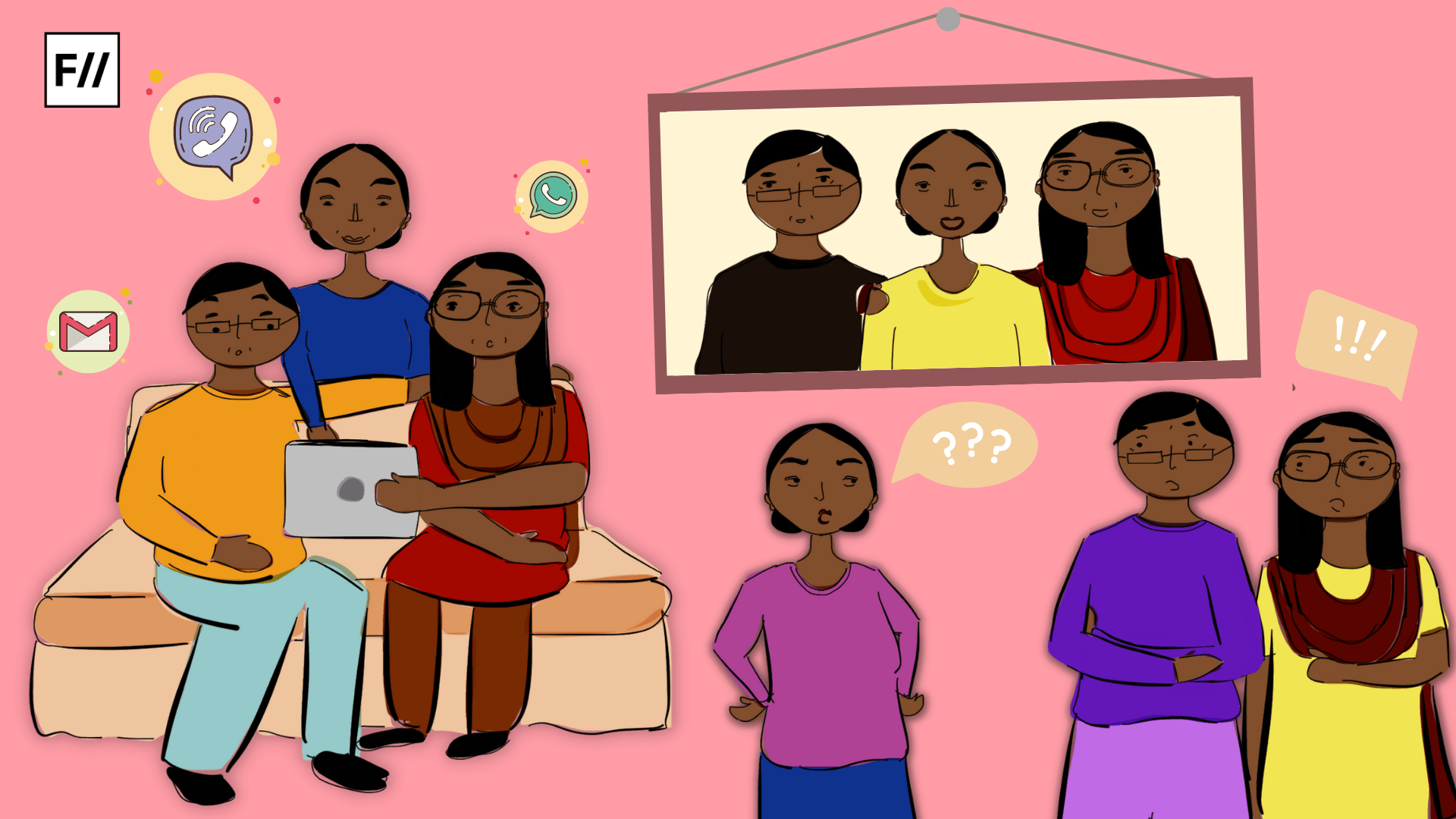Editor’s Note: FII’s #MoodOfTheMonth for September, 2021 is Parenthood. We invite submissions on the many layers of being parents, having parents and navigating the social norms of parenting throughout the month. If you’d like to contribute, kindly email your articles to sukanya@feminisminindia.com
Social media is rife with a plethora of content based on the idea of generation gap. Be it something as simple as a meme with two contrasting hairstyles or clothing options, or be it an elaborate thread of discussions prompted by trending phrases such as OK Boomer, social media tangibly reflects a very real tension between parents and children.
While age gap can be the root cause for some major conflicts between generations in families, it is also interesting to note that several endearing moments also occur as a result of the same. Therefore, the practice of negotiating with parents and grandparents as children, young adults or fully independent people has both its own share of turbulence and moments of warmth.
The conflicts become all the more charged in a culture that seems to be filled beyond capacity with a staunch reverence for traditions. These values are sometimes begrudgingly accommodating, and at other times in opposition with ideas that are usually dismissed as “modern” or “western”.

George Orwell very wisely said, “Each generation imagines itself to be more intelligent than the one that went before it, and wiser than the one that comes after it.” This can perhaps be fitting in all those instances where we just cannot win that argument with our parents even though we know we are right.
It hits harder when we realise with conviction that this feeling of being right is not because of bad attitude and arrogance as is often blamed on us, but because we are people from a different timeline, better informed and trying to be a bit more sensitive of the world around us. At this juncture, several of us would call a truce by summoning ‘the generation gap’ with a huff and sigh only to ‘agree to disagree’ and leave it at that.
Women as more pointed targets of generation gap
Young girls and women well into adulthood would be able to instantly count at least five instances where they felt misunderstood and stifled by parents and relatives whose opinions usually come with the self anointed wisdom of a lifetime’s worth of experiences and value systems that guide them.
Most parents might have reservations about things like tattoos, piercings and bright coloured hair. The reasons behind their objections are often attached to value systems that deem such bodily expressions of personality to be inappropriate while engaging in “professional” work environments or worse, unbecoming of an “ideal” girl soon to be in the marriage market.
Gender sensitivity, letting go of patriarchal norms, responding to normalised microaggressions aimed at regulating women, and inclusive attitudes towards the LGBTQIA+ community are often areas of disagreement between the older and newer generations in most households

The reasons for such parental and familial disapproval run deeper than mere rejection towards modern outlooks towards life, agency and individuality. This is where ideological conflicts often begin with the older generation largely being conservative when it comes to understanding newer sensibilities.
Gender sensitivity, letting go of patriarchal norms, responding to normalised microaggressions aimed at regulating women, and inclusive attitudes towards the LGBTQIA+ community are often areas of disagreement between the older and newer generations in most households.
These beliefs are heavily backed by years of cultural, religious and social experiences that contradict modern views that are often rendered rebellious and unrealistic. The problem escalates when such notions are imposed on bodily autonomy and life choices. Things like sexuality, marriage, parenthood and the ideal time and manner to do these things are dictated by a societal clock that runs on everyone else’s opinions and expectations, irrespective of the individual’s personal freedom.
Also read: Beyond Generation Gap: What Do Parents Think Of Anti CAA Protests?
Calling family out and initiating difficult conversations
The sensational “OK Boomer” and the plethora of memes it unleashed in its wake has its roots from the desire of the younger generation to hold the older ones accountable for refusing to change and re-examine outdated values. It critiques the ideological conflict between generations and presents it in formats that are both humorous and critical at the same time.
Quite many conversations between generations within families lead to emotional abuse, confinement, breaching personal boundaries and severe trauma. This is why it is important to establish safe spaces within our homes to have healthy and respectful conversations about difficult topics
An article by Nicole Specter on explores how this phrase can initiate constructive discussion around these issues. By pointing out that attitude is a deciding factor in these conflicts, the article highlights how communication could help us work our way around understanding one another, regardless of age.

Therefore, finding the middle ground seems to be the most effective way to raise our concerns, address relevant issues, and yet retain some semblance of familial peace post heated discussions. Personally speaking, there have been arguments that rapidly escalate in terms of volume and ‘taking it as a personal attack’, but upon calling a truce, those days have ended with family outings and perhaps wine after dinner together.
This is of course also a subjective experience of personal privilege. Quite many conversations between generations within families lead to emotional abuse, confinement, breaching personal boundaries and severe trauma. This is why it is important to establish safe spaces within our homes to have healthy and respectful conversations about difficult topics.
Handful of heartening moments
The generation gap also sometimes has its own share of endearing moments. Social media takes up this aspect with equal vigour by making those seemingly universal your mom’s phone memes in contrast to the low brightness and on-vibrate settings our phones perpetually seem to be on. There has also been a considerable number of tweets and reddit threads that recount adorable mistakes parents make with technology, all in good spirit.
The older generations have their struggles with new acronyms and lingo which often result in humorous yet memorable situations such as the one time an uncle of mine named a WhatsApp group with the initials BS which he definitely mistook for something else, unknowingly rendering the whole group absurd.
Management strategies and means of going through arguments and ideological conflicts may be different for different people and families. But eventual success and happiness lies in finding out what works best for each member. Negotiating personal freedom and treating all people as individuals, with respect, is key to making our peace with generation gap while also not compromising on expression, choice and agency

Interestingly enough, people in their twenties now are also faced with situations where we have had to look up phrases used by the younger crowd such as “bop” and “yeet”. This just proves that a generation gap is something that naturally creeps on all of us with its own set of frustrations and need for adjustments.
There comes certain moments in life when we realise that maybe we are not that dependent on our parents as we once were and this feeling recently found its most wholesome manifestation in something that happened in my house during the pandemic. For the first time, my family started depending on me for technological help to get accustomed to doing their jobs online.
The feeling that comes with being able to help the people whom we once relied on for everything is definitely both surreal and emotional at the same time. Therefore, a generation gap in a family is not something that can be avoided. But what makes all the difference is how each individual deals with it.
Management strategies and means of going through arguments and ideological conflicts may be different for different people and families. But eventual success and happiness lies in finding out what works best for each member. Negotiating personal freedom and treating all people as individuals, with respect, is key to making our peace with generation gap while also not compromising on expression, choice and agency.
Also read: Pandemic And The Elderly: A Generation Compelled To Adapt, Leave Behind Life As They Knew It
Featured Image Source: Ritika Banerjee for Feminism In India
About the author(s)
Akhila is a first year MA student pursuing English and Communication Studies at Christ University. She is hopeful about creating change through writing and academic praxis, and when that gets a little tiring, escapes into books and TV shows.




